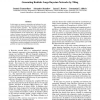Free Online Productivity Tools
i2Speak
i2Symbol
i2OCR
iTex2Img
iWeb2Print
iWeb2Shot
i2Type
iPdf2Split
iPdf2Merge
i2Bopomofo
i2Arabic
i2Style
i2Image
i2PDF
iLatex2Rtf
Sci2ools
108
click to vote
FLAIRS
2006
2006
Generating Realistic Large Bayesian Networks by Tiling
In this paper we present an algorithm and software for generating arbitrarily large Bayesian Networks by tiling smaller real-world known networks. The algorithm preserves the structural and probabilistic properties of the tiles so that the distribution of the resulting tiled network resembles the realworld distribution of the original tiles. By generating networks of various sizes one can study the behavior of Bayesian Network learning algorithms as a function of the size of the networks only while the underlying probability distributions remain similar. We demonstrate through empirical evaluation examples how the networks produced by the algorithm enable researchers to conduct comparative evaluations of learning algorithms on large real-world Bayesian networks.
Artificial Intelligence | Bayesian Networks | FLAIRS 2006 | Large Bayesian Networks | Real-world Known Networks |
Related Content
| Added | 31 Oct 2010 |
| Updated | 31 Oct 2010 |
| Type | Conference |
| Year | 2006 |
| Where | FLAIRS |
| Authors | Ioannis Tsamardinos, Alexander R. Statnikov, Laura E. Brown, Constantin F. Aliferis |
Comments (0)

